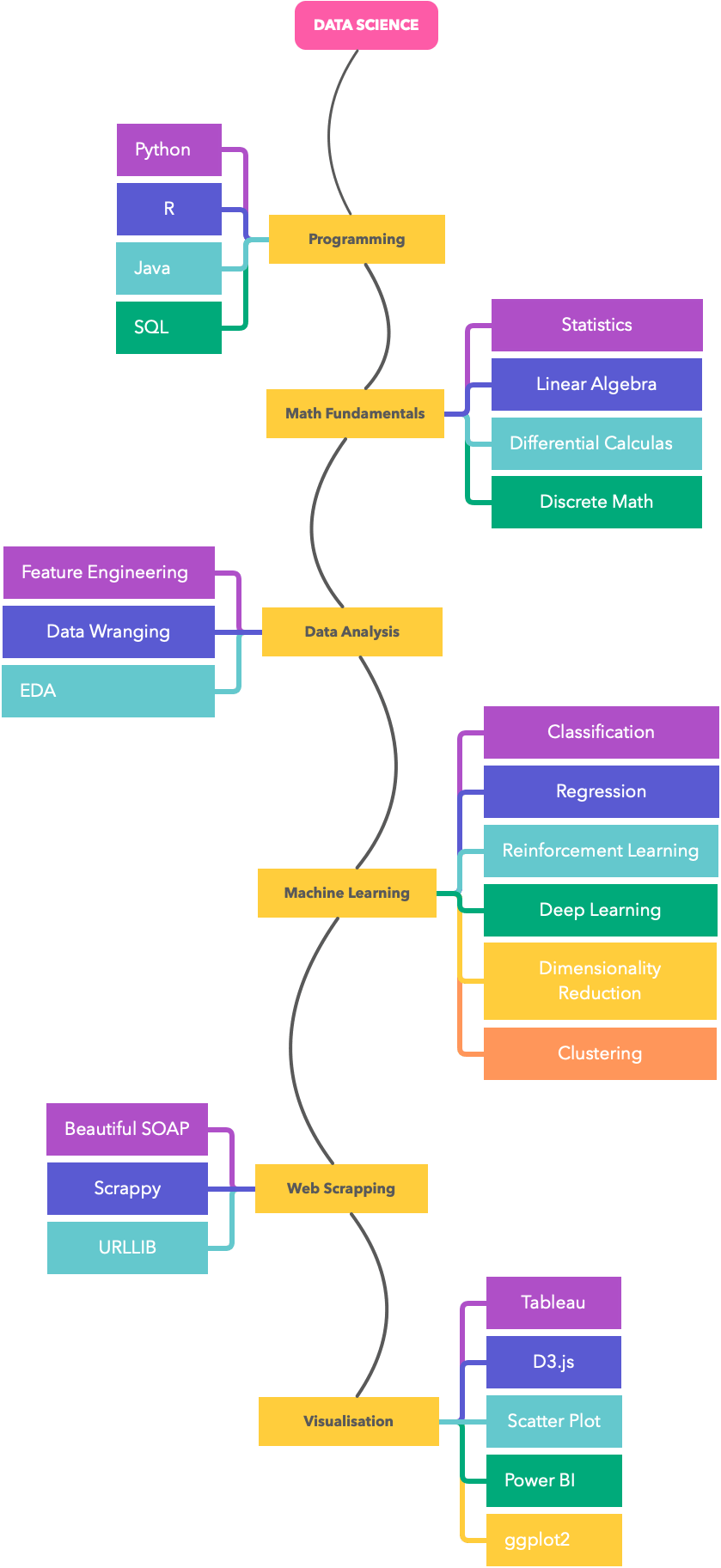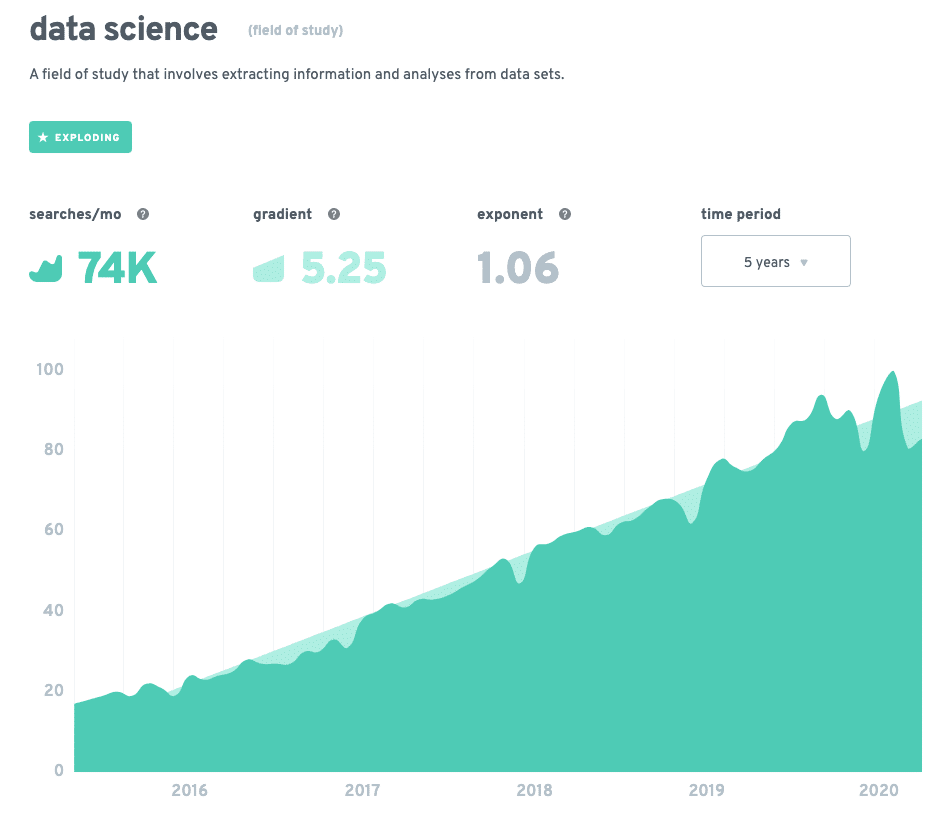Data Science Roadmap 2024: Learn To Become a Data Scientist

In this roadmap for data science learning, you can understand different verticals for data science and the areas you need to focus on if you are getting started with data science.
Here is the Data Science roadmap diagram.

Let’s look at each vertical and related resource to get started.
DataCamp Special Offer: Flat 50% off
Learn Programming Languages
It is very important to master a programming language related to data science. Following are the recommended resources to get started.
- Introduction to Python (Datacamp)
- An Introductory Guide to SQL (educative.io)
- Grokking Data Science (educative.io)
- Complete Python Bootcamp (Udemy)
- Python for Data Analysts (Pluralsight)
- Introduction to R (Datacamp)
- Getting Started With R (Edx)
Project Ideas
- Weather Data Analysis: Use Python to analyze historical weather data.
- Stock Price Predictor: Use R to predict stock prices based on historical data.
Learn Data Analysis
Data analysis is a very important vertical in data science. it helps in finding meaningful data by analyzing multiple sources of data. The data source and type of data could be different from org to org. Normally data collection happens through multiple sources to form a data lake.
There are many data management strategies used based on data classification.
Following are the recommended tracks to get started with data analysis.
- Data Analyst with Python (Datacamp)
- Introduction to Data Analytics for Business (Coursera)
- Data, Analytics, and Learning (Edx)
- Intro to Data Analysis (Udacity)
- Data Analytics Using Python (Futurelearn)
Tools
- Excel: Basic data sorting, filtering, and simple statistical functions.
- Power BI: For creating interactive dashboards and reports.
Learn Data Visualisation
Data visualization transforms massive amounts of processed data into meaningful visuals for the key stakeholders in the business. A business analyst can make use of this useful information to find opportunities for business growth.
The following are good resources to get started with data visualization.
- Data Visualization with Python (Datacamp)
- Data Visualization: A Practical Approach for Absolute Beginners (Edx)
- Learning Python for Data Analysis and Visualization (Udemy)
- Data Visualization Nano degree (Udacity)
Advanced Tools
- Tableau: For creating interactive and shareable dashboards.
- D3.js: A JavaScript library for creating dynamic data visualizations.
Best Practices
- Color Theory: How to choose colors that make your data stand out.
- Storytelling: How to convey a clear message through your visuals.
Learn Machine Learning
For all predictive analyses, machine learning is the key part. ML deals with data Classification, Regression, reinforcement learning, Deep learning, Dimensionality Reduction, Clustering, etc.
Get started with the following recommended machine learning resources.
- An Introductory Guide to Data Science and Machine Learning
- Machine Learning A-Z™: Hands-On Python & R In Data Science (Udemy)
- Introduction to Machine Learning Course (Udacity)
- Machine Learning with Python: From Linear Models to Deep Learning (Edx)
- Introduction to Machine Learning (Datacamp)
- AI and Machine Learning Algorithms Using Python (Futurelearn)
Frameworks
- TensorFlow: Open-source library for numerical computation and machine learning.
- PyTorch: Known for its dynamic computation graph, useful for deep learning.
Case Studies
- Healthcare: Using machine learning to predict disease outbreaks.
- Finance: Fraud detection using machine learning algorithms.
Learn Mathematics For Data Science
Mathematics is the foundation of all the key data science processes. It includes Statistics, Linear Algebra, Differential calculus, etc. Get started with the following resources.
- Mathematics for Data Science Specialization (Coursera)
- Linear Algebra for Data Science in R(Datacamp)
Practical Examples
- Statistics: How A/B testing is used in marketing.
- Linear Algebra: Its role in image recognition algorithms.
Additional Topics
- Probability Theory: Understanding uncertainty in data.
- Discrete Mathematics: Useful for algorithms and network theory.
Learn Web Scrapping
Web scraping is an added skill for any data science engineer. It is one of the common use cases you come across when working with data. Tools like Beautiful SOAP, Scrappy, and URLLIB makes it easier for web scrapping. Here are the resources you can get started with web scraping.
- Web Scraping in Python (Datacamp)
- Learn Web Scraping with Python from Scratch (Udemy)
- Web Scraping: Python Data Playbook (Pluralsight)
Ethical Guidelines
- Respect Robots.txt: Always check a website’s robots.txt before scraping.
- Rate Limiting: Don’t overload a website with too many requests.
Advanced Techniques
- Handling AJAX: Techniques to scrape AJAX-loaded content.
- CAPTCHAs: How to handle CAPTCHAs during web scraping.
Data Science Trends
Data science is an exploding topic in Google Trends. Here is the Google Trends data for data science.

Industry Applications
- Healthcare: Predictive analytics for patient care.
- Finance: Risk assessment and fraud detection.
Emerging Technologies
- Big Data: Handling large datasets for better insights.
- IoT: Internet of Things and its role in data collection.
Best Platforms to Learn Data Science Roadmap
A good data science curriculum-guided learning can speed up the learning process and avoid lots of confusion. Also interacting with the learning communities on the platform can help you figure out our issues when you start doing hands-on labs.
Here is the list of the best platforms to learn data science.
- Datacamp – A dedicated platform for learning data science
- Udemy Data Science Courses
- Educative.io
Community Forums
- Stack Overflow: For coding help and best practices.
- Reddit Data Science: For general advice and resource sharing.
Free Resources
- Coursera: Offers free courses from universities.
- edX: Free courses but charges for a verified certificate.
GitHub Repos to Learn Data Science & Python
One of the best ways to learn data science is by referring best resources curated by the Data Science Community on GitHub. The Following are the best GitHub Resources to learn Data Science and Python that are created by the Data Science community.
- Learn Python3
- Algorithms Implemented in Python
- Data Science Resources
- Awesome Data Science
- Data Science Resources
- Awesome Machine Learning
- Data Science iPhython NoteBooks
- Deep Learning Drizzle
Bonus Information
Following are some of the extra resources that could help you in your data science journey.
Real-world Projects
- Sales Prediction: Use historical sales data to predict future sales.
- Sentiment Analysis: Analyze customer reviews for a product.
Book Recommendations
- “Data Science from Scratch”: Covers the basics of data science.
- “The Elements of Statistical Learning”: A deep dive into statistical methods.
Podcasts and Blogs
- Data Skeptic Podcast: Covers topics from data science to machine learning.
- Towards Data Science Blog: Articles on various data science topics.
Frequently Asked Data Science Questions
When it comes to data science, it is not possible to answer all the questions in a simple way. People get into specific specializations in any one of the verticals we listed above. However, we try to answer or provide you with a reference for the common data science-related questions
How to become a data scientist?
Data scientists deal with most of the technologies related to data analysis. So there is no single answer. It depends totally on which specialization of data science you want to pursue. Here is a great article on this topic for your reference.
To put the long process short, here is what you have to do
- Get started with data science-related technologies.
- Get specialization in a specific skill.
- Get some practical experience working on a publicly available project or enroll a course with a real-world project. There are many data science courses available with real-world data science project-building tracks.
- Build a very good resume.
- Create a Portfolio. A blog would be great. You can publish your experiences and learnings there.
- Get Interviews
What skills are needed to be a data scientist?
The common skills required for data science it programming, data analytics, machine learning, and Math related to statistics, analytics, etc.
What is a Data Scientist’s Salary?
The average Data scientist’s salary is $99,072 as per the payscale
However, as per data jobs, the salary range of a data scientist is between $95,000-$180,000
Nowadays, this is a highly demanding job with an attractive salary. If you are interested in this area, don’t miss the above attractive courses with huge discounts.
Exclusive data science discounts will be available for Black Friday and Cyber Monday too. We will be updating the latest offers for the above courses.
Conclusion
In this data science roadmap, we have seen the key pillars of data science and related resources to get started with it.
This is a growing list as new tools and technologies emerge every day to accommodate different use cases in data science. Please let us your thoughts in the comment section to add more insights to the article.
The future is here and it’s bringing high-tech with its futuristic features. So stay updated with data science-related information and queries from here.
Also, check out the best data science courses from different e-learning providers.

This is the exact information I was looking over the internet. Thanks you for this great help and provide a proper road map in data science. You have shared really very nice articles. I like your website as well. Thanks for everything.
Thanks, Brij. Glad you liked the content.